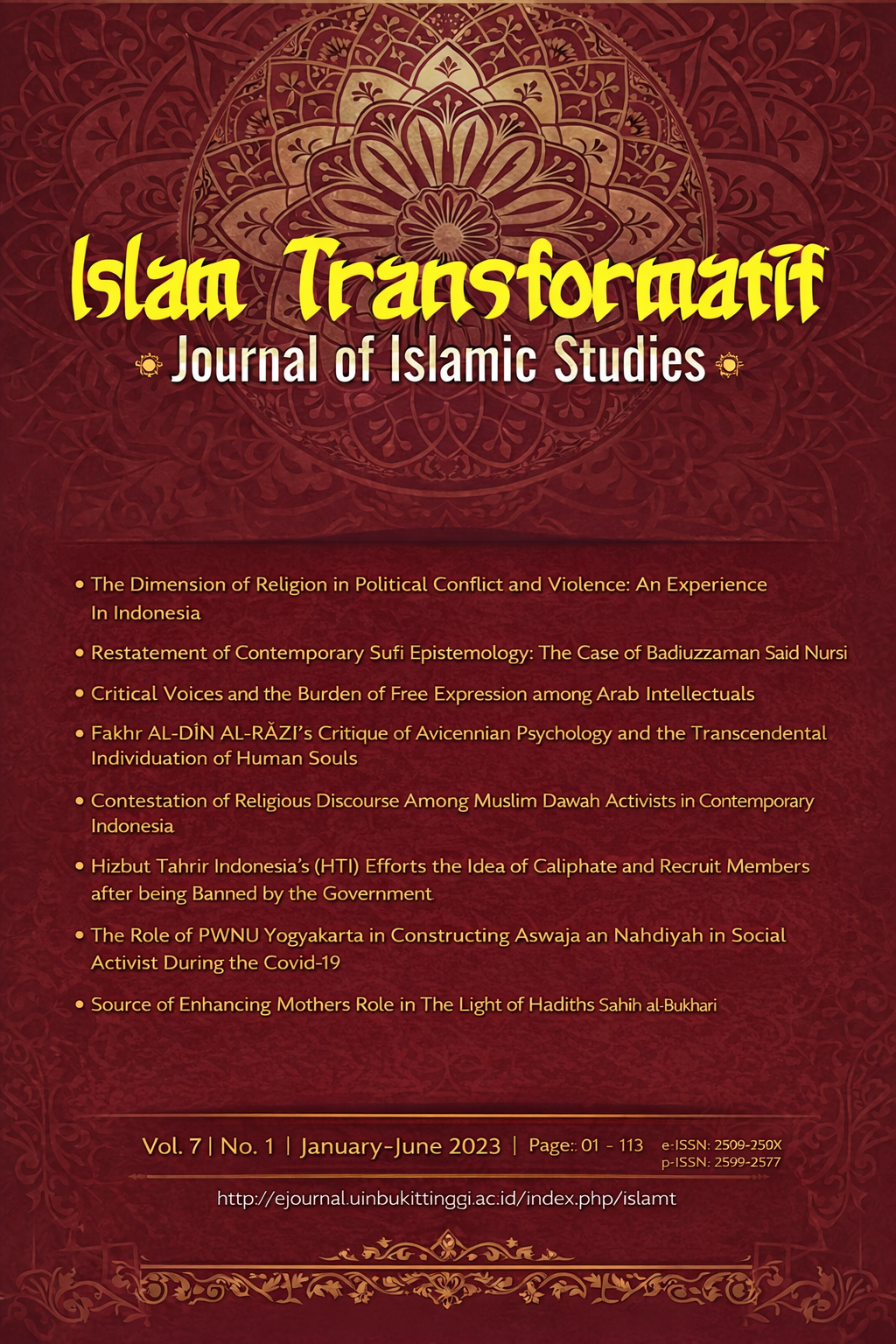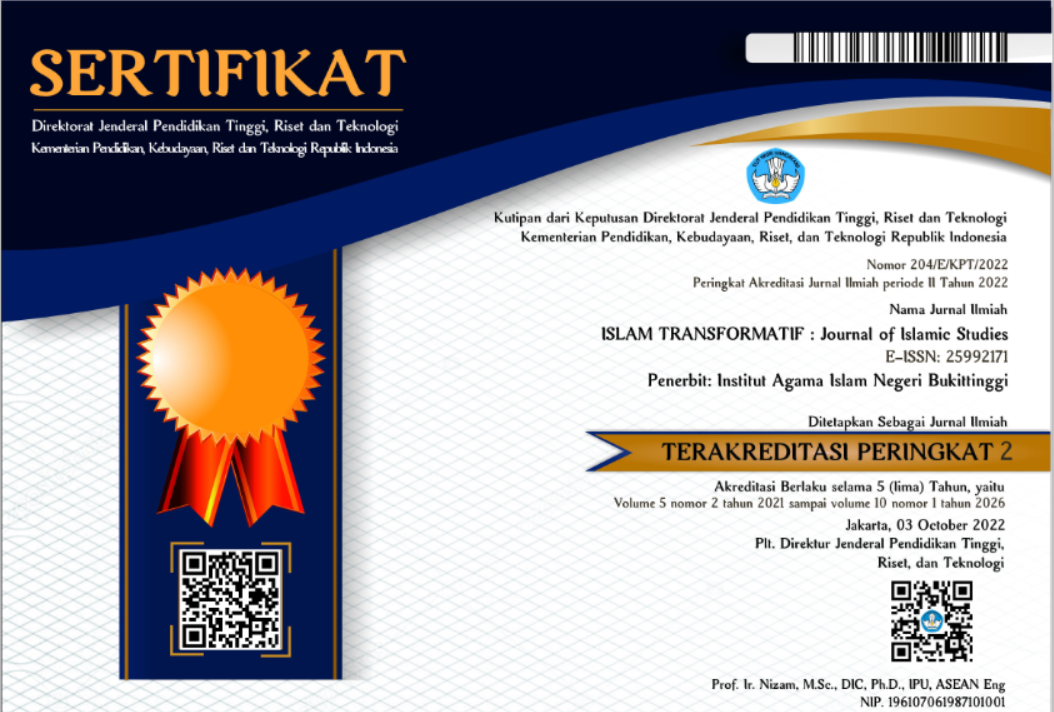The Role of PWNU Yogyakarta in Constructing Aswaja an Nahdiyah in Social Activist During the Covid-19
DOI:
https://doi.org/10.30983/it.v7i1.6340Keywords:
Islamic caliphate, perppu ormas, transnational islamic movementAbstract
References
Adler, Patricia A, Peter Adler, Norman K Denzin, and Yvonna S Lincoln. “Handbook of Qualitative Research.†Edited by Norman K. Denzin and Yvonna S. Lincoln, 1994, 377–92.
Andiono, Nurkilat. “PENGUATAN NILAI-NILAI ASWAJA ALA KIAI HASYIM ASYâ€TM ARI DALAM PENDIDIKAN KONTRA-RADIKALISME.†MIYAH: Jurnal Studi Islam 17, no. 01 (2021): 39–64.
Arifin, Bustanul. “Implikasi Prinsip Tasamuh (Toleransi) Dalam Interaksi Antar Umat Beragama.†Fikri: Jurnal Kajian Agama, Sosial Dan Budaya 1, no. 2 (2016): 391–420.
Bastomi, Hasan, and Abdurrohman Kasdi. “Kegiatan Filantropi Di Masa Pandemi Peran Satgas Nu Dalam Menanggulangi Dampak Covid-19 Di Indonesia.†Muslim Heritage 7, no. 1 (2022): 29–52.
Berger, Peter L. “Tafsir Sosial Atas Kenyataan: Risalah Tentang Sosiologi Pengetahuan,†1990.
Bruinessen, Martin Van. NU: Tradisi Relasi Kuasa Pencarian Wacana Baru. LKIS, 1994.
Burhani, Ahmad Najib. “Al-Tawassuá¹ Wa-l i ‘tidÄl: The NU and Moderatism in Indonesian Islam.†Asian Journal of Social Science 40, no. 5–6 (2012): 564–81.
Fathorrahman. “Interview Ahmad Bahiej, the Secretary of the Covid Task Force from PWNU Yogyakarta.†Yogyakarta, 2022.
———. “Interview Fahmi Akbar Idris PWNU DIY.†Yogyakarta, 2022.
———. “Interview KH. Hasan Abdullah Deputy PWNU DIY.†Yogyakarta, 2022.
———. “Interview KH. Mas’ud Masduki (Rais Syuriyah PWNU Yogyakarta).†Yogyakarta, 2022.
Fatmawati, Khairul Maya. “Nahdlatul Ulama Dan Nilai Aaran Ahlus Sunnah Wal Jamaah Sebagai Pembentuk Pilihan Pendidikan Masyarakat,†n.d.
Ganto, Jullimursyida. “Keadilan Distributif Dan Keadilan Prosedural Serta Pengaruhnya Terhadap Kepuasan Kerja.†Jurnal Administrasi Pendidikan 26, no. 1 (2019): 156–64.
Hidayah, Sri Noor Mustaqimatul, and Hasan Bastomi. “Peran Masyarakat Sipil Keagamaan Di Tengah Pandemi: Analisis Peran Nahdlotul Ulama (NU) Dalam Menghadapi Pandemi Covid 19 Di Indonesia.†Community Development: Jurnal Pengembangan Masyarakat Islam 4, no. 2 (2020): 129–56.
Huberman, A Michael, and Matthew B Miles. “Data Management and Analysis Methods.,†1994.
Kau, Sofyan A P, and Zulkarnain Suleman. “Fikih Tasamuh: Merajut Harmoni Dalam Keragaman Pendapat.†Al-Mizan 11, no. 1 (2015): 211–24.
Muhamad Rauf. “NU Struktural Dan NU Kultural.†In Berkhidmat Untuk NKRI, edited by Muhammad Rauf, 3–45. Tuban: Karya Litersa Indonesia, 2019.
Nugroho, Heru. “Menumbuhkan Ide-Ide Kritis (Edisi Revisi).†Pustaka Pelajar, 2004.
Ånday, Åzgür. “The Relationship between Concepts of Rational, Natural and Open Systems: Managing Organizations Today.†Business and Management 10, no. 1 (2018).
Penulis, Tim. “Aswaja An Nahdliyah: Ajaran Ahlus Sunnah Wal Jamaah Yang Berlaku Di Lingkungan Nahdlatul Ulama.†Surabaya: Khalista & PW LTN NU Jawa Timur, 2007.
Prasetya, Hendri. “Organizational Discourse: Ideologi Dan Relasi Kuasa Dalam Organisasi.†WACANA: Jurnal Ilmiah Ilmu Komunikasi 4, no. 2 (2005): 48–57.
Probosiwi, Ratih, and Afrinia Lisditya Putri. “Jogo Tonggo: Solidaritas Masyarakat Di Era Pandemi Covid-19.†Sosio Konsepsia 10, no. 2 (2021): 177–92.
Putra, Andri Azis. “How to Create Social Cohesion During Pandemic? A Sociological Analysis of Digital Voluntarism as the Path of the Reconstruction of Religious Consciousness in Indonesia.†Jurnal Sosiologi Reflektif 16, no. 2 (2022): 317–38.
Qomar, Mujamil. Implementasi Aswaja Dalam Perspektif NU Di Tengah Kehidupan Masyarakat. State Islamic Institute Of Tulungagung, 2014.
Salasiah, Salasiah, Diana Diana, Maskan Abdul Fatah, and Muhammad Ali Adriansyah. “Membangun Kepedulian Pada Sesama Di Masa COVID-19.†PLAKAT (Pelayanan Kepada Masyarakat) 2, no. 2 (2020): 160–66.
Saumantri, Theguh, and Rifqi Ulinnuha. “Aktualisasi Nilai Spiritual Dalam Menghadapi Pandemi Covid-19.†Jurnal Studi Hadis Nusantara 3, no. 1 (2021): 1–9.
Suhartawan, Budi. “Kepedulian Sosial Di Tengah Wabah COVID-19 Dalam Perspektif Hadis.†Jurnal Dirayah 2, no. 1 (2021): 1–18.
Sujana, Shifa Nisrina, and Sabiq Muhammad Ul-Haq. “The Recontextualization of the Spiritual Value Fasting in Improving the Body’s Immune System During the Covid 19 Pandemic.†Islam Transformatif: Journal of Islamic Studies 5, no. 2 (2021): 112–23.
Taufik, Ahmad. “Respons Komunitas Muslim Indonesia Terhadap Wabah COVID-19: The Responses of Indonesian Muslim Religious Community to the COVID-19 Outbreak.†Jurnal Bimas Islam 14, no. 2 (2021): 273–310.
Yakin, Ayang Utrisa. “Islam Moderat Dan Isu-Isu Kontemporer: Demokrasi.†Pluralisme, Kebebasan Beragama, Non-Muslim, Poligami Dan Jihad, Cet. I, 2016.
Yogyakarta, PWNU. “Laporan Pelaksanaan Satuan Tugas NU DIY Peduli Covid 19 Maret-Juli 2022.†Yogyakarta, 2022.
Yuhertiana, Indrawati. “Paradigma Positivis: Sebuah Tinjauan Epistemologi Penelitian Ekonomi,†n.d.
Yulianti, Yulianti, and Khoniq Nur Afiah. “Filantropi Islam Dan Pemberdayaan Masyarakat Di Masa Pandemi Covid-19: Studi Kasus Institut Kemandirian Dompet Dhuafa (Islamic Philanthropy and Community Empowerment During the Covid-19 Pandemic: A Case Study of Institut Kemandirian Dompet Dhuafa).†Jurnal Sosiologi Reflektif 16, no. 2 (2022): 401–22.
Yusuf, Ahmad, Mirza Mahbub Wijaya, Ahmad Mohdlori, Hadi Susilo, Muhamad Ansori, and Muchammad Nuryadi. “The Role of Personality Psychology in Islamic Religious Education.†Islam Transformatif: Journal of Islamic Studies 5, no. 1 (2021): 45–46.
Downloads
Published
How to Cite
Issue
Section
Citation Check
License
Copyright (c) 2023 fathorrahman

This work is licensed under a Creative Commons Attribution-ShareAlike 4.0 International License.
Authors who publish with this journal agree to the following terms:
- Authors retain copyright and grant the journal right of first publication with the work simultaneously licensed under a Creative Commons Attribution-ShareAlike 4.0 International License that allows others to share the work with an acknowledgment of the work's authorship and initial publication in this journal.
- Authors are able to enter into separate, additional contractual arrangements for the non-exclusive distribution of the journal's published version of the work (e.g., post it to an institutional repository or publish it in a book), with an acknowledgment of its initial publication in this journal.
- Authors are permitted and encouraged to post their work online (e.g., in institutional repositories or on their website) prior to and during the submission process, as it can lead to productive exchanges, as well as earlier and greater citation of published work (See The Effect of Open Access).




